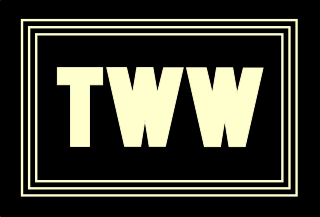
ITV, legally known as Channel 3, is a British free-to-air public broadcast television network. It is branded as ITV1 in most of the UK except for central and northern Scotland, where it is branded as STV. It was launched in 1955 as Independent Television to provide competition, eliminating what had hitherto been the monopoly of BBC Television. ITV is the oldest commercial network in the UK. Since the passing of the Broadcasting Act 1990, it has been legally known as Channel 3 to distinguish it from the other analogue channels at the time: BBC1, BBC2 and Channel 4.

Wales Television, known on screen as Teledu Cymru and often abbreviated to WWN, was the Welsh "Independent Television" contractor awarded the franchise area serving North and West Wales, from 1962. It began transmitting on 14 September 1962, and ceased on 26 January 1964 through financial failure; the franchise area was soon combined with the South Wales and West of England area, operated by TWW. TWW retained the Teledu Cymru name in the former WWN franchise area, as did successor Harlech during their emergency transitional franchise, only retiring the name when they were able to officially take over.

ABC Weekend TV was the popular name of the British broadcaster ABC Television Limited, which provided the weekend service in the Midlands and Northern England regions of the Independent Television (ITV) network from 1956 to 1968. It was one of the "Big Four" companies that between them produced the majority of ITV networked programmes during this period.

Television Wales and the West (TWW) was the British Independent Television contractor for a franchise area that initially served South Wales and West of England until 1968.

The Independent Television Commission (ITC) licensed and regulated commercial television services in the United Kingdom between 1 January 1991 and 28 December 2003.

ITV1 is a British free-to-air public broadcast television channel owned and operated by the British media company ITV plc. It provides the Channel 3 public broadcast service across all of the United Kingdom except for the central and northern areas of Scotland where STV provides the service.

Associated Television was the original name of the British broadcaster ATV, part of the Independent Television (ITV) network. It provided a service to London at weekends from 1955 to 1968, to the Midlands on weekdays from 1956 to 1968, and to the Midlands all week from 1968 to 1982. It was one of the "Big Four" until 1968, and the "Big Five" after 1968, that between them produced the majority of ITV networked programmes. In 1982, ATV was restructured and rebranded as Central Independent Television, under which name it continued to provide the service for the Midlands.

Thames Television, commonly simplified to just Thames, was a franchise holder for a region of the British ITV television network serving London and surrounding areas from 30 July 1968 until the night of 31 December 1992. Thames Television broadcast from 09:25 Monday morning to 17:15 Friday afternoon at which time it would hand over to London Weekend Television (LWT).
United Kingdom Independent Broadcasting (UKIB) is an affiliation of three British independent television production companies and broadcasters. The primary function of its predecessor, the Independent Television Companies Association (ITCA), was to represent independent British television interests as a member of the European Broadcasting Union (EBU). The current members of UKIB are the ITV network centre, the 4 ITV licence holders, Channel 4, and S4C.
The history of ITV, the United Kingdom and Crown Dependencies "Independent Television" commercial network, goes back to 1955.
Analogue terrestrial television in the United Kingdom was originally the method by which the significant majority of viewers in the UK, the Channel Islands and the Isle of Man received television. Analogue terrestrial television broadcasts have fully ceased in the UK with Northern Ireland being the last region to have ceased transmission analogue terrestrial television broadcasts. Northern Ireland switched off the last analogue television signals, making all of the United Kingdom only capable of receiving digital television, in the early hours of 24 October, 2012. It has been completely replaced by digital terrestrial television and other non-terrestrial means as of the end of 2012.

ITV Wales and West, previously known as Harlech Television (HTV), was an ITV franchisee in the United Kingdom until 31 December 2013, licensed to broadcast by the regulator Ofcom.
In the 1960s and 1970s, an envisioned fourth UK television service was popularly referred to as ITV2, before the launch of Channel 4 in November 1982.
This is a timeline of the history of the British television network ITV.
This is a timeline of the history of ITV in Wales, including the current service ITV Cymru Wales. It does not include events that affect the whole UK network.
This is a timeline of the history of the British television service HTV West. "HTV West" and "ITV West" were the service names for the ITV service in the West of England from 1970 until 2009, after which the service name "ITV West Country" has been used across the West and South West of England. The "West" service was a sub-region of the franchise for Wales and the West.
This is a timeline of the history of television in Wales. It does not include events that affect the whole UK.
This is a timeline of television in London.
This is a timeline of the history of regional news on the British television network ITV.
This is a timeline of the history of the British television company ABC Weekend TV, one of the first four contractors of the Independent Television network.











